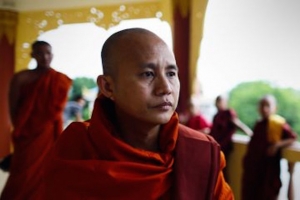The weekly update on the Secular Policy InstituteÔÇÖs Fellows
by Madeline Schussel
 SPI Fellow Mark Juergensmeyer is a Professor of Sociology and Director of Global and International Studies at the University of California, Santa Barbara. He won the Grawemeyer Award for his book Terror in the Mind of God and has also authored The New Cold War? Religious Nationalism Confronts the Secular State and Gandhi’s Way: A Handbook of Conflict Resolution.
SPI Fellow Mark Juergensmeyer is a Professor of Sociology and Director of Global and International Studies at the University of California, Santa Barbara. He won the Grawemeyer Award for his book Terror in the Mind of God and has also authored The New Cold War? Religious Nationalism Confronts the Secular State and Gandhi’s Way: A Handbook of Conflict Resolution.
This week, Juergensmeyer spoke with monk Ashin Wirathu, who was portrayed in 2013 on the cover of Time magazine international as ÔÇ£The Face of Buddhist TerrorÔÇØ, since he is credited with inciting angry Buddhists in Myanmar to riot against the Muslim minority. Their violent crimes included attacks and burnings of thousands of Muslim shops, houses, and even citizens. Wirathu is the most well-known spokesperson of the ÔÇ£969 MovementÔÇØ, which is regarded as the anti-Islamic hate movement at the core of these riots. Representatives of the UN Commission on Human Rights have identified Wirathu as one of the main figures in MyanmarÔÇÖs pattern of human rights abuse against Muslims.
But when Juergensmeyer visited WirathuÔÇÖs monastic office, the monk told him repeatedly that support of Buddhism creates peace in the world. Wirathu shared his own spiritual cultureÔÇÖs vulnerability to attack, insisting there was a need to protect his people. When Juergensmeyer pressed Wirathu to reveal who, specifically, was out to destroy Buddhism, the monk conceded that ÔÇ£Islamic extremistsÔÇØ were the main threat he perceived. He went on to express his belief that virtually all Muslims in Myanmar were susceptible to the influence of these extremists, and therefore, all were criminally suspect.
Juergensmeyer noted that Wirathu had a number of unsubstantiated notions about how Muslims were a threat to Buddhism, including intermarriage with Buddhist women, and secrecy within mosque communities. The monk also cited the atrocities of al Qaeda and ISIS as examples of overall Muslim terror, and confessed a fear of their growing numbers. Wirathu insisted that Buddhist violence could be justified in the context of defense, although he admitted that Buddhist ethics prohibited violence of any kind. According to Wirathu, rich Muslim countries have bribed the UN, making it ÔÇ£the United Muslim NationsÔÇØ. He also accused the US President and the international media of being swayed by these forces. Juergensmeyer asked Wirathu if he and the BBS (a militant Buddhist organization) were working together, and he admitted that he had met with Gnanasara, their general secretary, but not that the groups had a unified agenda.
Later that day, Juergensmeyer talked with a Muslim leader who insisted that Muslims in Myanmar were of no threat to anyone, implying that Wirathu was acting on behalf of certain politicians who wanted, for their own purposes, to undermine and terrorize the Islamic community. Other journalists and political leaders in Myanmnar agreed with this assessment. Many believed that by creating an artificial Islamic threat, the militaryÔÇÖs party would be seen as a strong defender of the nation, and those in power would profit again in upcoming elections. It was unclear whether Wirathu was aware of his own possible role in these political manipulations. However, it was clear to Juergensmeyer that the monk has adopted a polarized worldview more typically forwarded by theistic traditionsÔÇöthat of a battle between Good and Evil.
